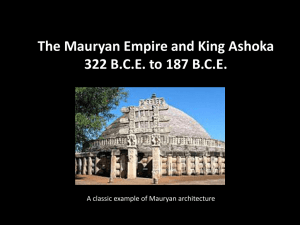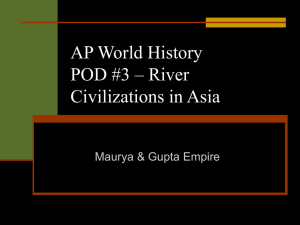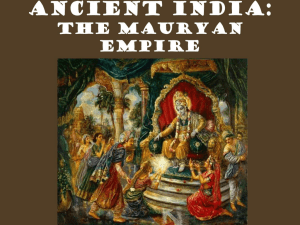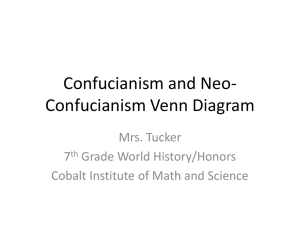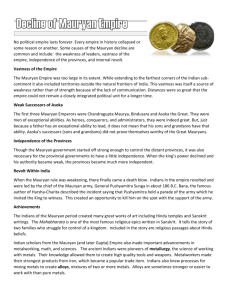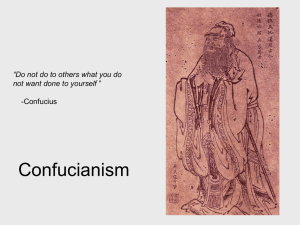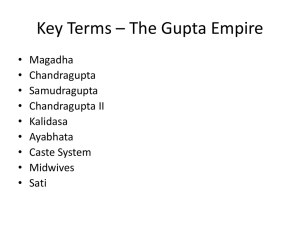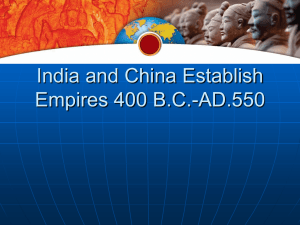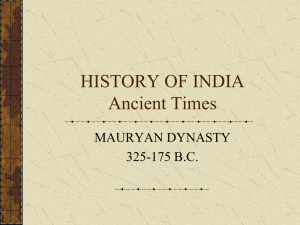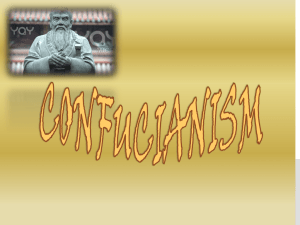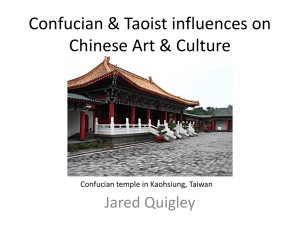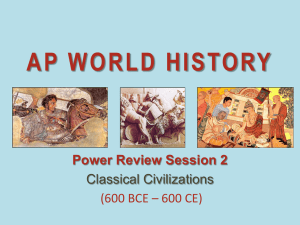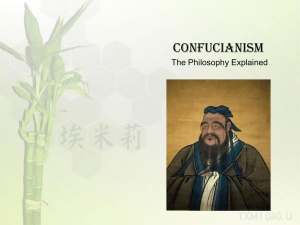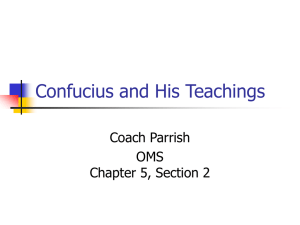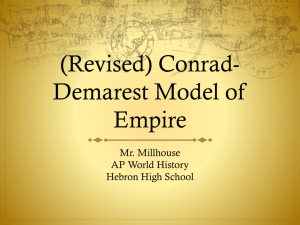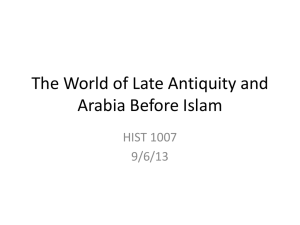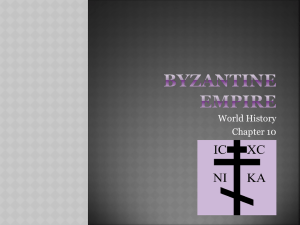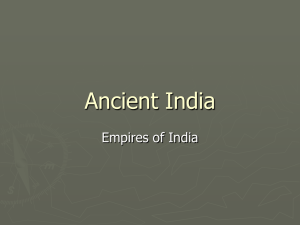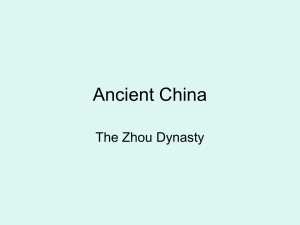Aim: What impact did the first empires of India
advertisement
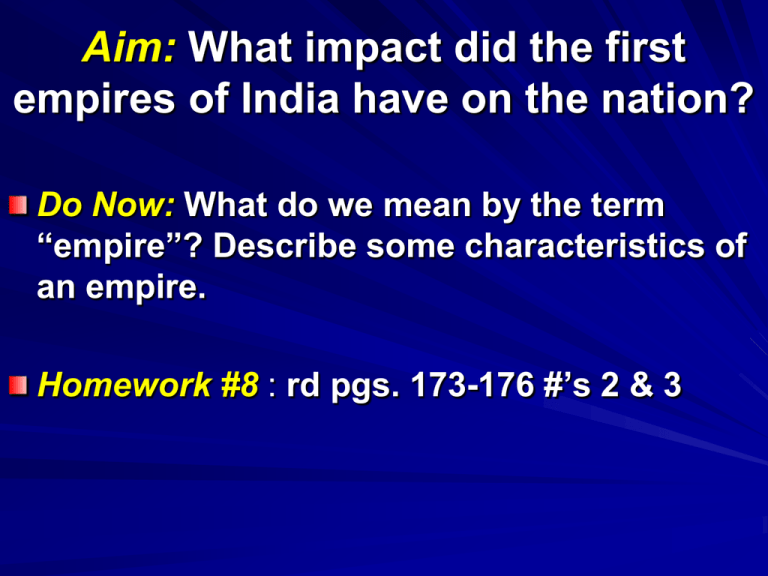
Aim: What impact did the first empires of India have on the nation? Do Now: What do we mean by the term “empire”? Describe some characteristics of an empire. Homework #8 : rd pgs. 173-176 #’s 2 & 3 The Mauryan Empire Founded by: Chandragupta Mauryan (321 B.C.E.) Defeated Greek forces and expands his empire more than 2,000 miles Famous for uniting north India for the first time Chandragupta Mauryan Chandragupta Mauryan Policies: Waged war to expand empire-over 90,000 soldiers & 9,000 elephants Divided empire into 4 districts Why would Chandragupta do this? Heavy Taxes on trade, mining, and agricultureTaxed farmers half of their crops Was Chandragupta wise to use heavy taxes to finance his huge army? The Mauryan Way “Farmers are exempted form military service and cultivate their lands undisturbed by fear. They do not go to cities for business. It therefore frequently happens that at the same time, in the same part of the country, men may be marshaled for battle and risking their lives against the enemy, while other men are plowing or digging in perfect security under the protection of these soldiers.”— Megasthenes 1) Did Mauryan India place a high value on agriculture? 2) What information in this quote indicates that? Ashoka Mauryan ► ► ► Comes to power in 301 B.C.E. Greatest of all Mauryan rulers Accomplishments: 1) Converted to Buddhism ► 2) Practiced non-violence, equality, caring for others ► 3) All of his people were “His Children” ► 4) Religious Toleration ► 5) Improved road conditions throughout the empire ► Ashoka- Grandson of Chandragupta The Gupta Empire ► ► ► ► ► ► After 500 years of turmoil after Ashoka’s death, Gupta becomes India’s second empire Founded by Chandra Gupta I in 320 A.D. Mostly agriculturally based economy Draught Irrigation Farmers were taxed for water and donated one day a month to dig irrigation ditches Established trade with Mediterranean world Aim: What are the origins of Confucianism? ►Do Now: Compare and contrast Ashoka and Chandragupta Mauryan. List 1 similarity and 1 difference!!! ►Homework #9: Rd. 97-101- Pg. 102 #’s 18, 19 and 20 So, who was Confucius anyway? ► Born in 551 B.C.E. during the Zhou Dynasty of China ► Believed to be the first private teacher in China ► Developed the belief system of Confucianism…not a religion!!!! ► Became the foundation for Chinese government and social order Confucius O.K., but what is Confucianism??? Confucianism is a belief system centered around 5 specific relationships: 1) ruler and subject 2) father and son 3) husband and wife 4) older brother and younger brother 5) friend and friend **A code of proper conduct regulated each relationship** Confucius’ ideas were collected in a book titled Analects Why was there a need for Confucianism? Confucius believed that social order, harmony and good government will come from the 5 relationships Belief in filial pietyrespect for ones’ elders or parents Belief in educationimportant to the welfare of the individual and society See which of the 5 relationships apply to following famous Confucian sayings and try to put the phrases into your own words!!! 1) “When leading a large state, one must respect the office and be trustworthy; economize in the use of resources and love the people and employ the people when it is timely.” 2) “If a ruler himself is upright, all will go well without orders. But if he himself is not upright, even though he gives orders, they will not be obeyed.” 3) “A filial son supports his parents with joy, cares for them in sickness, grieves at their death; he sacrifices to them with solemnity.” 4) ”Without steadfastness, the gentleman would not command respect, and his learning would not be sound. Advocating loyalty and trustworthiness, he has no friend who is not his equal.” 5) “To be prudent in mourning, and to remember those who have passed away before, is to enhance the virtue of the people.” Aim: How did Taoism and Legalism compare to Confucianism? Do Now: Confucius said- "If, because a man's discourse appears solid and sincere, we allow him to be a good man, is he really a superior man, or is his gravity only in appearance?" What does this mean? HOMEWORK #10-Create your own “wise Confucian phrase” to help govern China. Indicate which of the 5 relationships it refers to and why you feel it is important to the well-being of the people in society. Founded by Laozi6th century B.C.E. Believed the relationship between all living things was important- Natural Order Universal forces called Tao, meaning “the way” guides all things Compare Taoism to Confucianism. List the similarities and differences? Taoism Two powers that represent the Natural Rhythm of Life Here are three Taoist philosophy statements and three conversations from The House at Pooh Corner by A.A. Milne. Can you guess which Taoist philosophy statement might go with which conversation? 1) The wise know their limitations; the foolish do not. 1) "Rabbit's clever," said Pooh thoughtfully. "Yes," said Piglet. "Rabbit's clever." "And he has a Brain." "Yes," said Piglet, "Rabbit has a Brain." There was a long silence. "I suppose," said Pooh, " that's why he never understands anything." 2) There is more to knowing than just being correct. 2) "Lot's of people talk to animals," said Pooh. "Maybe, but..." "Not very many listen, though," he said. "That's the problem," he added. 3) A clever mind is not a heart. 3) Roo and Tigger were walking along the forest one morning, and Tigger was talking about all the things that Tiggers can do.... "I can swim," said Roo. "I fell into the river, and I swam. Can Tiggers swim?" "Of course they can. Tiggers can do everything." "Can they climb trees better than Pooh?" asked Roo, stopping under the tallest Pine Tree, and looking up at it. "Climbing trees is what they do best," said Tigger. "Much better than Poohs." And the next thing they knew, they were stuck in the tallest pine tree. Legalism • A highly efficient and powerful government is the key to social order • Punishments are useful to maintain social order • Thinkers and their ideas should be strictly controlled by the government Look back to your notes on the principals of Confucianism, Taoism and Legalism. Compare & Contrast the 3 systems. List any similarities and differences. Answer the following: 1) Which of the 3 systems stresses the importance of govt. and a well-ordered society? 2) Which system emphasizes the natural order over the social order? 3) Which of these systems seems to be the most moderate and balanced? Explain.
